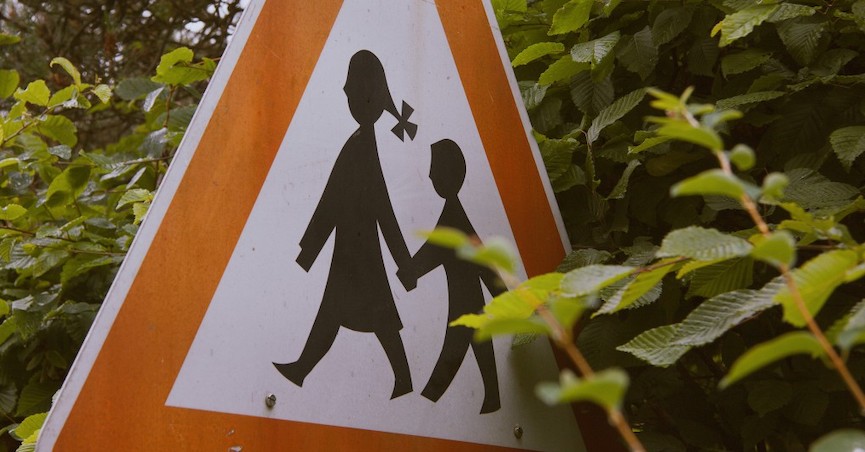The video went viral. You’ve probably seen it. A mom pushes a stroller and almost gets hit by a car. She accuses the driver of running a stop sign and throws herself on the car’s hood. The driver of the car attempts to drive away and she is carried with it, leaving the baby’s stroller in the middle of the street. Another car careens close to the stroller, swerves around, and drives on.
How we interpret this video tells us a lot about ourselves. Is it a video about dangerous drivers in Toronto (and the mother is a hero)? Or, is it a frightening example of a mother’s irresponsibility (she is a monster)? To me, it’s a video of maternal rage — the kind of rage that is powerful and rational, but not strategic. It’s a force that overtakes you and sometimes makes you do things that could make the situation worse. Maybe this mother isn’t a hero or a monster. Maybe she’s human.
In 2014, I was attacked while pushing my two children in a stroller down the tree-lined streets of our Oakland neighborhood. It was 4 p.m. and a man ran up to me from behind, throwing his weight on me as the stroller overturned into the street. The kids (a one-year-old and a three-year-old) were mostly uninjured. I should have told him to take my bag and go; I should have yelled for help. But my body in that moment was pure maternal rage. I screamed at him, and I fought back.
My children are the most important things in the world to me. They are also extremely vulnerable. Because these two things are true, I believe my outrage was rational. But I know it was not strategic. My aggressive response could have made my attacker lash out even more. It is the same with the mother in the video: she could have been seriously injured when she threw herself on the hood of the car, and her child could have been hit by another car in the street.
As a counsellor with over a decade of experience in private practice and social service settings, I know that people act differently under stress. Crisis situations can bring out sides of ourselves we didn’t know were there. But there’s something particularly powerful — and, to many, unacceptable — about mothers’ anger.
Amongst mammals, mothers in particular behave differently under threat. While most adult animals will do their best to avoid a threat, maternal mammals stay and face it head on, fighting it off until it leaves, not unlike the mother in the video chasing the car. Cats, bears, moose, rats, and apes are known to exhibit this kind of behavior. The phenomenon called “hysterical strength,” in which a parent performs a seemingly superhuman feat, such as lifting a car off a child, is another example.
Then there’s lactation aggression. A 2011 study found that women who were breastfeeding were more likely to show aggressive responses to rudeness. Even without lactation, lab studies on rats show the simple bonding hormone oxytocin, which is released at exceptionally high rates between well-bonded parents and children, increases aggression in mother rats when they are threatened.
Mothers are often depicted as bastions of unconditional love. But it is the very force of love that makes this protective rage possible.
Unfortunately, we don’t trust women’s anger. In 2015, psychologists Jessica Salerno and Liana Peter-Hagene found that while the opinions of angry male jurors were taken more seriously, female jury members who expressed anger lost credibility. The Victorian era leftover that envisions mothers as beatific and joyful leads us to dismiss maternal rage, in particular. UBC researcher Christine Ou found that while postpartum depression is finally getting its due in treatment and research, persistent postpartum anger — which may be connected to anxiety or guilt — is not.
In a society wrought with patriarchal values, it can be hard to see women’s humanity. This is particularly true once they become mothers. As the holes in our social safety net grow ever-wider, societies and governments rely on mothers more and more. Individual mothers, not governments, are tasked with a near total responsibility for the safety and well-being of their children. If a child is injured at a water park or contracts meningitis or is preyed upon online, it is now commonly understood to be, somehow, at base, the mother’s fault.
It is as if by becoming a mother, a woman not only loses her own humanity but gains responsibility for another’s. But if, instead, we choose to see women as human, they are both fallible and deserving of support. And our obligation to support women throughout all reproductive stages is more urgent than ever. The Trudeau government is currently considering how much money to put aside for worldwide maternal health outcomes. Treating women as people has vast real-world implications, not just for women in Canada but for women around the world.
Canada’s current federal commitment to worldwide maternal health funding expires in 2020, and NGOs are leaning on the government to set aside $1.4 billon a year until 2030, to support reduced maternal deaths, greater access to birth control, and other health measures. What will we, as a country, decide? Are mothers worthy of support?
Throughout human evolution and throughout history, women have protected their children from threats of violence with their own bodies, their own rage. More likely than not, you are here because one of your many maternal ancestors protected her child. Did she do it perfectly, in accordance with the social mores of the time and forethought of which she was ordinarily capable? No. Did she succeed? Most likely, the answer is yes.
Svea Vikander is a Swedish-Canadian radio host and counsellor currently residing in Berkeley, California. Find her on twitter (@SveaVikander) and Instagram (@SveaVikander).
Image: barnimages.com/Flickr
Help make rabble sustainable. Please consider supporting our work with a monthly donation. Support rabble.ca today for as little as $1 per month!





